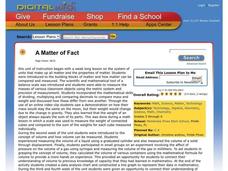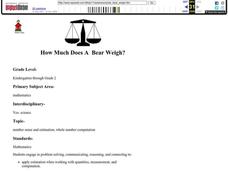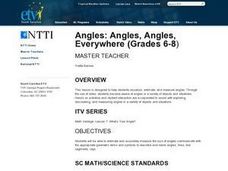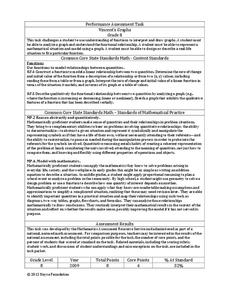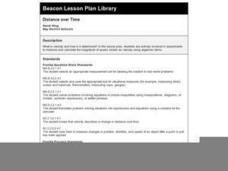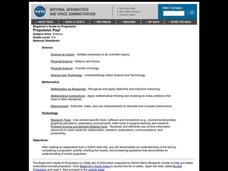Curated OER
A Matter of Fact
Students design their own Science experiment. In this science experiment lesson students create a hypothesis related to matter and test it. They displayed their data in a graph.
Noyce Foundation
Time to Get Clean
It's assessment time! Determine your young mathematicians' understanding of elapsed time with this brief, five-question quiz.
Virginia Department of Education
Isotopes
Lead your class through the amazing world of isotopes as they investigate the various properties they contain and further understand their respective location on the periodic table. They explore half-lives and radioactivity as each...
Curated OER
How Much Does a Bear Weigh?
Students estimate how many children in their class it would take to equal the mass of one adult bear. They then weigh and record their measurement on a chart to check their estimate.
Curated OER
How Long? How Wide?
Second graders distinguish between and use nonstandard and standard units of measurement, use appropriate tools and techniques to measure length and width, and record and interpret data using graphs.
Curated OER
Angles: Angles, Angles, Everywhere
Students practice estiminating and measuring angles. After watching a short video, they identify angles in objects in the classroom and their homes. In groups, they participate in activities in which they are given a scenerio and are...
Curated OER
Automobile-Accident Reconstruction
Students investigate an accident and relate it to math. In this trigonometry lesson, students measure the accident scene, the friction produced, and the speed from the skid marks. They create a poster of their findings.
Curated OER
Hurricanes and Tornadoes (Grade 4-8)
Students investigate the concepts of hurricanes and violent weather conditions. In this violent weather lesson, students access an Internet site and watch a video about how air masses behave, how a tornado forms, how hurricanes form, and...
Curated OER
Move It! With Simple Machines
Students explore engineering by participating in a mechanical class activity. In this simple machines lesson, students identify many simple machines that allow them to perform tasks easily each day. Students collaborate in small groups...
Curated OER
Proteomics
Students analyze data taken from proteomic experiments. In this biology lesson, students explain the importance of bioinformatics tools in the study of proteins. They evaluate scientific results using math and computer software.
Curated OER
Project Geode
Students predict the appearance of a geode's internal structure based on its mass and density. They form a hypothesis based on the data they collect. They also identify common minerals found in Illinois.
Curated OER
Pop Rocket - Trash to Treasure
First off, Newton's laws of motion aren't often taught at 2nd grade, so this lesson plan may be more appropriate for upper elementary learners. It begins with a discussion and demonstration of the laws of motion, and then has individuals...
Royal Society of Chemistry
Organic Molecules Day—Chemistry Outreach
In search of an organic lab that employs real-life techniques and analysis methods? Groups carry out the nitration of methyl benzoate, then attempt to determine the number and location of the nitro groups added to the benzene ring....
Inside Mathematics
Vencent's Graphs
I like algebra, but graphing is where I draw the line! Worksheet includes three multiple-part questions on interpreting and drawing line graphs. It focuses on the abstract where neither axis has numbers written in, though both are...
Curated OER
Pounds and Ounces: It's All About Weight
First graders explore number sense by participating in a measurement estimation activity. In this weight lesson, 1st graders discuss the differences between measurement units, both English and Metric. Students examine a loaf of bread to...
Curated OER
Distance over Time
Students analyze velocity and how it is determined. They experiment with velocity in order to measure and calculate the magnitude of speed. They use examples in their novel "Skateboard Renegade" to relate velocity to real life situations.
Curated OER
As a Matter of Fact!
Students explore matter. They use a formula to measure the volume of matter.
Curated OER
Surface Area with Polydrons
Students explore measurements by analyzing geometric shapes. In this surface area lesson, students identify the terms volume, weight, perimeter and area in order to find the requested measurements of specific polygons. Students utilize...
Curated OER
Paper Packaging Design
Learners create packages with a maximum capacity. In this geometry lesson ,students estimate using whole numbers, decimals and fractions. They calculate length, weight and mass of packaging.
Curated OER
Propulsion Pop!
Students demonstrate an understanding of the text by completing a propulsion activity, charting the results, and answering questions that demonstrate an understanding of rocket propulsion.
Curated OER
Measuring Angles
Third graders describe an amount of turn from a particular position to another using the 'circular' benchmarks of 0, ++, ++, ++, and full turn. Estimation language such as 'just about', 'between', 'not quite', 'just over', and similar...
Curated OER
The Average Atom - Isotopes
Seventh graders, in groups, complete an Isotopes model and notice that atomic masses are decimal numbers. These masses are an average of all the isotopes of that element.
Curated OER
Customary Measurement Conversions
Fifth graders discover in hands-on activities the relationships between the measures. They work in groups to create conversion tables using familiar measuring tools. Students solve problems requiring conversions.
Curated OER
Is It There?
Young scholars participate in a lesson designed to illustrate these concepts using simple materials. They use Science process skills to observe, measure, predict, make inferences, and communicate while completing the activity. Proper...


